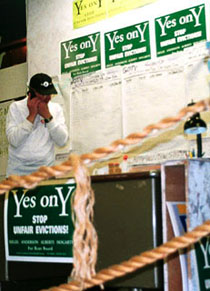

![]()
|
|
|
|
A volunteer at the Yes on Y headquarters makes last minute phone calls on election day. |
|
|
The measure, which strictly limits "owner move-in evictions," received 55 percent of the vote. Measure Y would prohibit evictions: · Of the elderly and disabled, if they lived in their units for more than five years and their landlords own at least four units; · If tenants have lived in the unit for more than five years; · Or if the landlord owns a comparable vacant unit anywhere in the city. In addition, $4,500 in relocation fees would be available to low-income tenants, and landlords or their relatives would be required to move into the unit within three months of the eviction and live there for at least three years. Current city law requires that the landlord or relative must live in the unit for two years, but they do not have to move in within any specified time. "Owner move-in evictions are the most manipulated form of causes for eviction. These types of evictions have tripled in the last couple years," said Paul Hogarth, a member of the "Yes on Y" campaign and a candidate for the Berkeley Rent Stabilization Board. Owner move-in eviction notices tracked by the rent board rose from 26 in 1997 to 88 last year. Supporters of Measure Y believe these evictions are meant to empty rental units, allowing landlords to raise rents as much as they want on vacant units. In California, every time a tenant moves, or is evicted, from a rental unit, landlords can raise rents to market level. This has contributed to Berkeley's rapidly rising rents, according to Larry Harris, treasurer of the Committee to Defend Affordable Housing and a member of the Berkeley Rent Stabilization Board. "The housing crisis is turning into a war. Your interest is to pay a reasonable rent. The landlords want to get as much possible," said Harris. Advocates of the measure include the Committee for Defending Affordable Housing, the City of Berkeley Commission on Disability, the Berkeley Grey Panthers, the student senate at the University of California at Berkeley, Dona Spring and Linda Maio of the Berkeley City Council and Berkeley Rent Stabilization Board Commissioners Max Anderson and Randy Silverman. The landlord-backed "No on Y" campaign argues the measure does not protect the elderly and disabled. Robert Cabrera, president of the Berkeley Property Owners Association, said the measure may discourage people from renting to long-term tenants, like seniors and the disabled, because of limits on evicting tenants who have lived on the property for at least five years. The measure is opposed by Berkeley Mayor Shirley Dean, the Berkeley Chamber of Commerce, and city council members Polly Armstrong, Betty Olds and Diane Wooley-Bauer. San Francisco passed a similar initiative, the Ellis Act, in 1998. Since then, according to city statistics, the number of owner move-in evictions has decreased.
|
||


